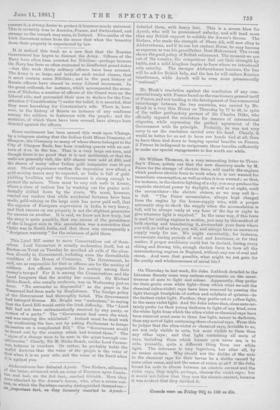Some excitement has been caused this week upon 'Change, by
a telegram stating that the Indian Gold Mines Company, of Glasgow, the Company so many of whose shares belonged to the City of Glasgow Bank, has been crushing quartz with an out- turn of 4 oz. to the ton. That is a very large out-turn, and though there is no proof that it is not accidental, or that the reefs are generally rich, the £10 shares were sold at £65, and the shares of many other Indian gold companies rose 50 per cent. Should experience confirm the impression now afloat, a gold-mining mania may be expected, as India is full of gold- yielding localities, and the Government is strong enough to protect the miners. There must be very rich reefs in Assam, where a class of natives live by washing out the grains acci- dentally drifted down by the rivers. We must, however, remind our readers that while accidental fortunes have been made, gold-mining on the large scale has never paid well, that the expense of European supervision in India is very heavy, and that success on one property is not the slightest guarantee for success on another. It is said, we know not how truly, but the story is quite possible, that one reason of the persistence of the Glasgow men in this speculation was a conviction that Ophir was in South India, and that there was consequently a "Scripture warranty" for the existence of gold there.




























 Previous page
Previous page